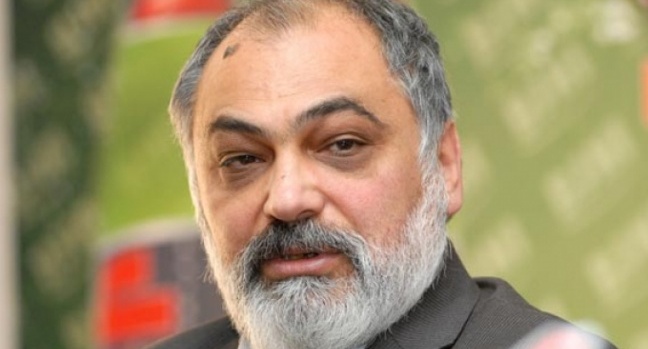“Köprüleri inşa etmek Türkiye'ye kalıyor”


24-26 Haziran'da Papa Francis Ermenistan ziyaretini gerçekleştirdi. Ziyaret sırasında Papa Francis Ermeni Soykırımı hakkında konuştu ve Ermenistan-Türkiye ilişkilerinin normalleşmesine yönelik önemli mesajlar verdi. Ermenistan’ın Bilimler Milli Akademisi Doğu Bilimleri Araştırma Enstitü Başkanı Ruben Safrastyan'la Türkiye-Ermenistan ilişkilerinin normalleşmesi çerçevesinde Papa'nın tarihi ziyaretini konuştuk, Türkiye Ermenileri Patrik Vekili Aram Ateşyan'ın Papa'nın ziyareti için toplanan Ermeni ruhani liderleri arasında yer alamayışına değdik.
“Soykırımın tanınmasını hızlandırır”
Papa Francis'in, Ermenistan ziyareti sırasında Ermenilerin 20. yüzyılın başında uğradığı katliamları için “büyük felaket” ve “soykırım” terimlerini yan yana kullanması ile ilgili Ruben Safrastyan şunları söyledi: “Bu iki terimin farklı anlamı olduğunu düşünüyorum. Büyük felaket (medz yeğern) Ermeniler için uğradıkları felaketi işaret eden bir terimdir. Soykırım ise hukuki ve akademik bir terim ve söz konusu suç için belli bir ceza gerektiren bir terim. Bu yüzden de Papa Francis'in soykırım terimini kullanmasını çok önemli buluyorum.”
Papa Francis'in soykırım açıklamalarının Ermeni soykırımının uluslararası düzeyde tanınması için etkileyici olacağına inanan Safrastyan, “Dünya Katolikleri lideri olmakla birlikte Papa'nın sivil toplumda ve hatta siyasette önemli figür olduğu vurgulamak lazım. Ve onun soykırım terimini kullanması dünyada Ermeni Soykırımı'nın tanınmasını hızlandıracak diye düşünüyorum” dedi.
“Şartlardan vazgeçilmeli”
Papa Fracis'in Ermenistan ziyareti sırasında yaptığı açıklamaların Ermenistan-Türkiye arasındaki ilişkileri nasıl etkileyeceğine dair soruya Ruben Safrastyan şu yanıtı verdi: “Papa Francis, açıklamalarında net bir şekilde barışa, iki ülke arasında ilişkilerin normalleşmesine yönelik çağrı yapıyordu. Ve Türkiye hükümetinin Papa'nın çağrılarına dikkate alacağını umuyoruz. Zira bence Ermenistan-Türkiye ilişkileri/ilişkisizliği Türkiye'nin yürüttüğü siyasetten kaynaklanıyor. Ermenistan, Türkiye ile koşulsuz ve şartsız ilişkilerin normalleşmesine hazır olduğunu defalarca belirtti. Türkiye ise şartlar koşuyor” dedi.
Papa'nın soykırım açıklamaları kamuoyunda konuşulurken, Türkiye Dışişleri Bakanlığı'nın açıklaması da gecikmedi. Bakanlık Papa'nın ziyaretini kınadı ve onun açıklamalarının barışa, bölgedeki istikrara katkı sağlamadığını vurguladı. Konuyla ilgili olarak Ruben Safrastyan: “İkili ilişkilerine gelince, Türkiye'nin özellikle de Dışişleri Bakanlığı'nın Papa'nın açıklamalarından sonra siyasetini değiştireceğini sanmıyorum. Ermenistan'a karşı siyasetin yönünü değiştirmek ilk önce şartlardan vazgeçmek ve Ermenistan'la koşulsuz, şartsız diplomatik ilişkiler kurmak demektir. Bunun sonucu ise Türkiye'nin Ermenistan'la olan sınırın açması olur” dedi ve yürütülen siyasette bunun işaretlerini görmediğini ekledi.
Almanya Federal Parlamentosu'nda Ermeni Soykıırımı tasarısının kabul edilmesinin ardından Türkiye Ermenileri Patrik Vekili Başepiskopos Aram Ateşyan'ın Cumhurbaşkanı Tayyip Erdoğan'a yazdığı mektup Ermenilerde büyük bir tepki yaratmıştı. Ermenistan kamuoyu Papa'nın Ermenistan ziyareti için Ermenistan'da olmayı planlayan Aram Ateşyan'ı protesto etmişti. Ermenistan'da yükselen tepkiler üzerine Ateşyan ziyaretini iptal ettiğini açıklamıştı. Ruben Safrastyan ise: “Bence ruhani liderlerimiz Ermenistan'da toplanmışken Türkiye Ermenileri Patrik Vekilimizin de orada olması gerekirdi” dedi.



